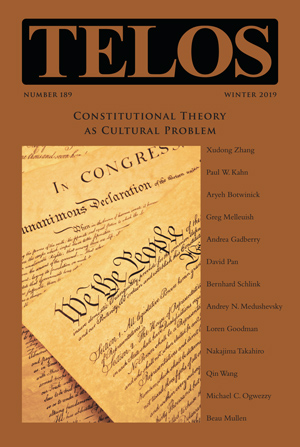In today’s episode of the Telos Press Podcast, Camelia Raghinaru talks with Takahiro Nakajima about his article “Constitutionalism and Sovereignty: On Constitutional Problems in Japan,” from Telos 189 (Winter 2019). An excerpt of the article appears below. If your university has an online subscription to Telos, you can read the full article at the Telos Online website. For non-subscribers, learn how your university can begin a subscription to Telos at our library recommendation page. Purchase a print copy of Telos 189 in our online store.
Constitutionalism and Sovereignty: On Constitutional Problems in Japan
Nakajima Takahiro
The Constitution of Japan is none other than a declaration of human rights for Japanese society.
—Higuchi Yōichi
1. Democracy and Constitutionalism
In this paper I wish to consider the relationship between constitutionalism and sovereignty. Recent years have seen the debate about constitutional revision in Japan pushed forward by the ruling Liberal Democratic Party (LDP), and the content and methods of this debate have attracted criticism from constitutionalist perspectives. Professor Hasebe Yasuo of Waseda University, one of Japan’s eminent theorists of constitutionalism, made the following remark:
In my view, starting with the issue of Article 9, the debate on constitutional revision is missing a critical perspective: that of constitutionalism. Namely, the perspective that explains, in the first place, why we strive to make a constitution that constrains state power, and other such issues. [1]
 According to Hasebe, constitutionalism does not mean “respecting and obeying the constitution” (12). The world abounds with constitutions, he notes, whose substances are not actually constitutionalist. So it is not an issue of respecting and obeying a constitution but one of how constitutionalism itself “restricts state power” (13). Even state power based on democracy must be restricted.
According to Hasebe, constitutionalism does not mean “respecting and obeying the constitution” (12). The world abounds with constitutions, he notes, whose substances are not actually constitutionalist. So it is not an issue of respecting and obeying a constitution but one of how constitutionalism itself “restricts state power” (13). Even state power based on democracy must be restricted.
Hasebe refers to the ideas of Louis Henkin, a former professor of international law at Columbia University, who distinguishes between constitutionalism’s two elements: first, the sovereignty of the people and a system of representative democracy based on this; and second, the restraining of state power via separation, checks and balances, and respect for individual human rights. Drawing on this distinction, Hasebe writes:
We must pay attention to how these two elements have the potential to mutually conflict or collide. In brief, if the majority group of sovereigns—the people—usurps the rights of persons who belong to a particular race or class, this accords with the viewpoint of democracy. However, the principle of restraining state power based on respect for human rights deems such actions unjust. (12–13)
Here Hasebe turns a truly wry gaze on democracy. Touching on the work of Robert Dahl, a former professor of political science at Yale University, Hasebe writes that “democratic politics cannot resolve problems related to the fundamentals of society” (40). Concrete examples of the failure of democracy to keep this in mind include the liberation of slaves in the United States, the question of Algerian independence in the French Fourth Republic, and the ideological clashes in the Weimar Republic.
Given this, what suitable approaches might we take toward problems that we cannot, or perhaps should not, try to resolve with democracy? There are multiple ethical stances crucial enough to concern issues of life and death, and whose relative merits cannot be peremptorily decided; how should we best confront such issues? Hasebe here suggests that “it is possible for differing ethical stances to fairly coexist—justice, in that sense, may be realized—and we may opt for the way of building a framework of social life—that is, the way of constitutionalism” (58). What, then, does Hasebe mean by referring to “a framework of social life where it is possible for differing ethical stances to fairly coexist”? He continues:
States that take constitutionalism as their premise are not states that bestow inclusive meanings and aims on their citizens’ lives. This is because they preside over congregations that embrace a diversity of mutually irreconcilable worldviews and life aims, even as they require an equitable distribution of the benefits of communal life. The state’s ability to confer significance is thus limited to a space where it rationally discusses and decides issues of the common good pertaining to all citizens. (158)
In other words, a constitutionalism that embodies what Hasebe calls “the principle of restraining state power based on respect for human rights” is one that places constraints on the state’s power to impose particular meanings and aims on its citizens. One example where such a constraint is needed concerns the issue of state power forcing citizens to potentially die fighting an external enemy, the premise on which military conscription is based (158–59).
Continue reading this article at the Telos Online website (online subscription required). If your library does not yet subscribe to Telos, visit our library recommendation page to let them know how.
1. Hasebe Yasuo, Kenpō to heiwa wo toinaosu (Tokyo: Chikuma Shobō, 2015), p. 8. Additional references cited parenthetically; see full article for detailed source information. Article 9 of the Constitution of Japan reads as follows: “(1) Aspiring sincerely to an international peace based on justice and order, the Japanese people forever renounce war as a sovereign right of the nation and the threat or use of force as means of settling international disputes. (2) In order to accomplish the aim of the preceding paragraph, land, sea, and air forces, as well as other war potential, will never be maintained. The right of belligerency of the state will not be recognized.”








